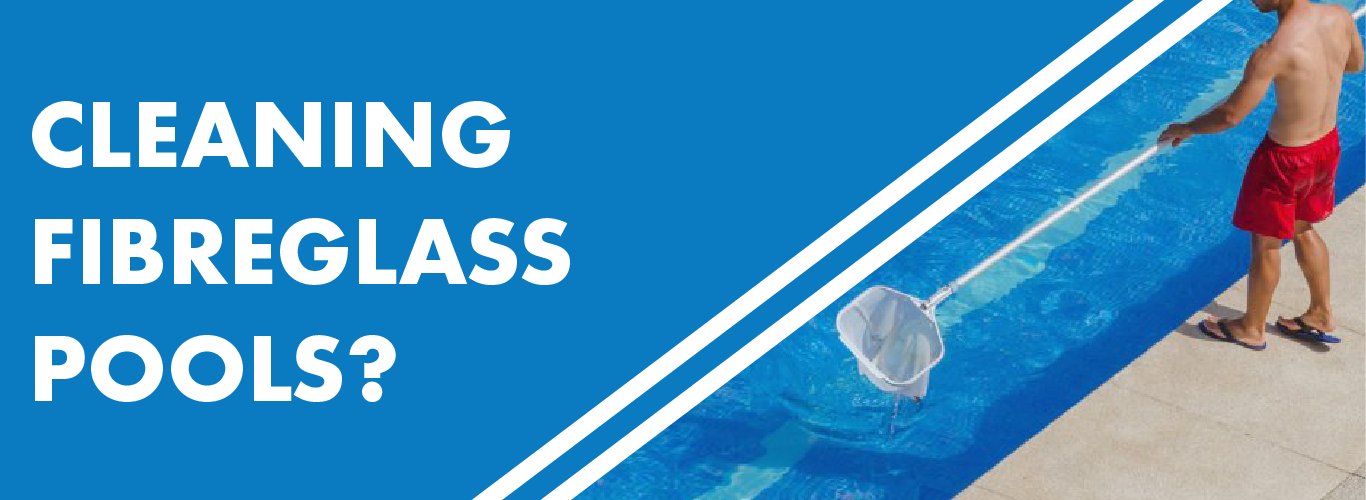How Do You Clean A Fibreglass Swimming Pool?
If you’ve purchased a fibreglass pool, one of the things you might want to know is how to clean it. That is of course if you decide to do it yourself rather than sourcing a pool cleaner to take care of it for you. The great thing about fibreglass pools is, they are very easy to maintain, much easier than other types of pools such as concrete and vinyl.

Here are some handy tips to keeping your pool in tip top shape all year round:
Clean debris from your pool regularly
Even if your pool is located in an isolated position in the backyard with no trees or plants surrounding it, it is a high possibility that you will still find leaves, insects and other debris floating around your pool. The chances of finding these in your pool if trees and plants are nearby, is even higher. A dirty pool is unpleasant to look at and not very healthy to swim in, to keep your pool clean, it’s essential to have a regular cleaning timetable.The good news is pool maintenance tools are relatively cheap to purchase. A pool leaf scoop has a long telescope handle which allows you to remove dirt and leaves from anywhere in your pool. Anything you cannot remove with a pool scoop, your vacuum will clean up.
Only use quality products that are designed for your pool
Products that are not designed for cleaning fibreglass pools can contain harsh chemicals which may damage your pool. The wrong type of cleaner will also disrupt the chemical balance of the water. Brushes with stiff bristles are not advised to use on your pool as this may scratch the surface of the fibreglass. It is best to use products suited to fibreglass pools for the best results and to maintain the quality of your pool for many years to come.
Keep an eye out for stains
Stains are not only unappealing to look at, but they are in indication that there is an imbalance in your pool water. They are generally caused by high concentrations of metal. It is important to know which kind of metal is staining your pool before you try to treat it. Different types of metals leave different coloured stains. For instance, high levels of magnesium will result in grey stains, iron causes a maroon coloured stain and copper leaves a blue-green stain. Your pool is also susceptible to organic stains caused by things such as leaves, dirt and algae. These stains are generally green and brown in colour.To prevent stains in your fibreglass pool, it is important to remove debris and use a metal chelating agent. Our experienced team can provide further education on this.
Filter and water quality
Every pool, fibreglass included need a quality filter pump to maintain the water quality, so it is clean to swim in. A pool pump generally runs for 6-8 hours a day for saltwater and slightly longer for chlorine. By running the pump during the day, you will avoid any imbalances in your water, and it will stay nice and clean, ready to use at your leisure.An important factor to maintaining your pools water quality is the pH level. Ideally, the pH of your pool should be between 7.2 and 7.6. The alkaline levels should be around 80 to 120 parts per million (PPM) and the chlorine just under 3.0 PPM. It is a good idea to have these chemicals so you can add them when necessary to adjust the levels of your pool water.
Pool cover
The best way to prevent your pool water from getting tainted is by using pool cover. This will ensure that your pool is free from leaves and other debris. This reduces the need to manually remove leaves and dirt, therefore decreasing maintenance for when you are not using your pool.When installing a fibreglass pool, you will have the choice of using saltwater or traditional chlorine to sanitise your water. Saltwater being the more popular choice mainly due to it being gentler on the skin than chlorine. Both saltwater and chlorine have their pros and cons. You can find out more info regarding this in our “Can Fibreglass Pools Be Saltwater?” article. Fibreglass pools are much easier to maintain than concrete or vinyl liner pools. Concrete pools are porous and are vulnerable to algae overgrowth, vinyl liner pools are better at keeping algae at bay, although, it is known to grow in the seams of the vinyl liner and also in the nooks and crannies of the plastic stairs where there is poor water circulation. The smooth gel coat of a fibreglass pool is nonporous and virtually algae resistant.
A little bit of maintenance goes a long way
Fibreglass pools require the least upkeep, however, they still do require some maintenance, even if it is a small amount. If you create a cleaning timetable and keep an eye on the chemical balance regularly, your pool should stay clean and healthy year-round. If maintaining your pool is not something you want to be responsible for, we recommend hiring a professional pool cleaner to maintain and service your pool. This will ensure optimal functionality and one less thing you have to worry about. If you have any questions in regards to keeping your fibreglass pool clean, our friendly team are happy to help. Give us a call today.
